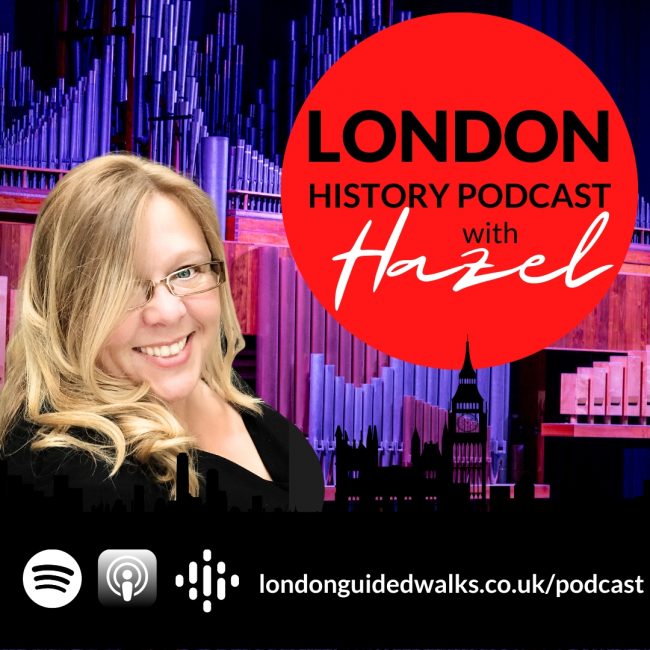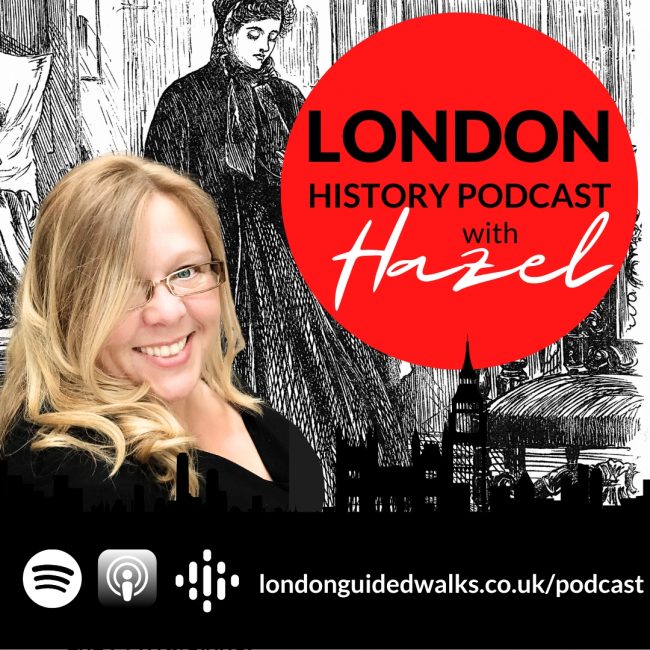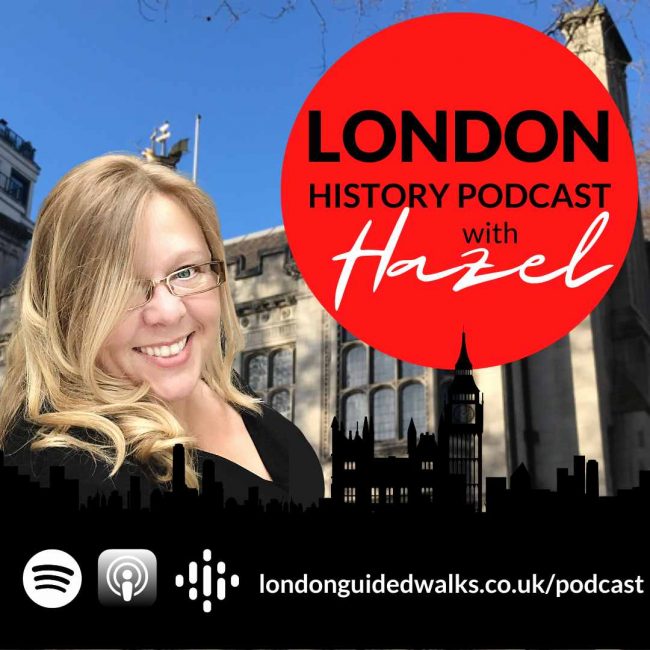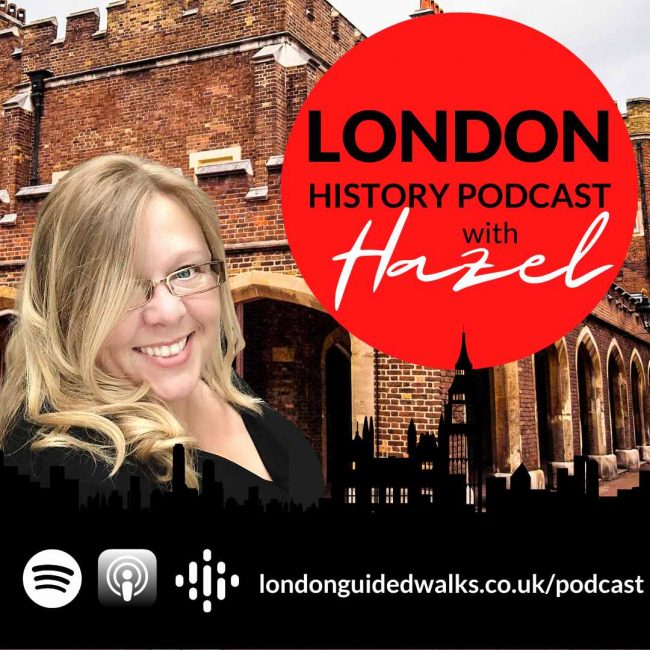Show Notes:
 Hazel Baker: Hello and welcome to London Guided Walks London History podcast. In the coming episodes, we will be sharing our love and passion for London, its people, places and history in an espresso shot with a splash of personality. For those of you who don’t know me, I am Hazel Baker, founder of London Guided Walks, providing guided walks and private tours to Londoners and visitors alike.
Hazel Baker: Hello and welcome to London Guided Walks London History podcast. In the coming episodes, we will be sharing our love and passion for London, its people, places and history in an espresso shot with a splash of personality. For those of you who don’t know me, I am Hazel Baker, founder of London Guided Walks, providing guided walks and private tours to Londoners and visitors alike.
Don’t forget our blog is regularly updated with posts written by our passionate team of quantified London tour guides.
And there are hundreds to choose from all absolutely free kick off the new year. I’m just going to do it. I am going to use the B word: Brexit. This is Britain’s breakaway from the European Union. We know that Brexit means Brexit. Putting aside all the politics, what does it really mean for the city of London in this historic event?
I’ve invited City of London tour guide Ian McDiarmid to join us. And he incidentally does a very interesting financial tour in the city as well. Thanks for joining us again.
 Ian McDiarmid: My pleasure, Hazel.
Ian McDiarmid: My pleasure, Hazel.
Hazel Baker: So you are all things finance and I need some help with Brexit. So let’s get down to it. Why is the city of London so important when we’re talking about Brexit?
Ian McDiarmid: Well, simply put the city is enormous financial services. So that’s the city and all the other financial jobs in the UK make up about 10% of the United kingdom’s economy, which is massive. And when I say financial services as a whole, this includes all the jobs that are scattered around the country. The only other financial centre.
That really matters is Edinburgh. And that’s only a tiny fraction of the size of London, but it’s important in, in fund management, but there are lots of back-office jobs, lots of administrative jobs, uh, scattered around the country. And they’re probably about 700,000 people employed by this sector. And it just hasn’t been featured in the Brexit negotiations at all. Theresa May, when she became prime minister, one of the first things she said was to make it clear that the UK was going to leave the single market. And the single market is that bit of the EU market that covers services and that the negotiations were just going to concentrate on.
The so-called customs union, which is the bit that covers physical goods. And there’s an irony here because people will know whether they were following the news with a degree of keenness or with absolute bore boredom that fisheries were featuring very heavily in the negotiations.
Hazel Baker: Yes. I noticed that. Why was that then?
Ian McDiarmid: Simply because fishing fisherman make very good. Uh, photographing photograph opportunities for politicians. So Boris Johnson shaking the hands of a fishermen somewhere goes plays very, very well. But in contrast to him, say shaking the hands of some banker, which isn’t going to play very well, particularly in their newly won Northern constituencies.
However, fisheries make up about point naught, 5% of GDP. So the government was spending. Awful lot of time, wrangling over a sector, Mike credible detail over a sector, which is one, 200th of the size of the city and the city just hasn’t featured in the government’s negotiations and really hasn’t featured in the government’s concerns, it seems. And I think. This has got a lot to do with the fact that the city itself has been very reluctant to stick its head above the parapet and be too prominent in the Brexit debate simply because bankers are so unpopular partly as a result of that, the 2008 crisis, when people had said taxpayers, ordinary people had to pay out huge sums to bail out the, the banking industry.
But also, I mean, the bank has just aren’t popular. Ever, but I mean, this is from an economic point of view from the point of view of the interests of the United Kingdom. This is just absolutely ridiculous. Now. With this importance, there is a downside and that is that financial companies, the financial sector is huge in the UK and the problem is something called systemic risk.
In most sectors of the economy. If a company gets into difficulty, it’ll create a little local difficulty. Create problems around it, maybe for it suppliers, but basically it’s, the company goes down, the shareholders lose all their money. The trouble with banks is systemic risk. If a bank goes down, it’ll bring its creditors with it.
So not only does the bank fail, but whole sectors of the economy brought down with it. And this is systemic. Risk. And as a result of systemic risk for the better part of the last 200 years, central banks have stepped in to rescue banks when they get into crisis, it doesn’t always happen. The federal reserve in America didn’t do it for Lehman brothers, but the bank of England did step into rescue RBS, Lloyds bank, and a raft of others.
And the reason they do this is because the cost of the economy would be so huge if they didn’t. But this. Means that having finance financial services are so big, a part of your economy is risky and it also creates huge resentment because when they do get into difficulty, the taxpayer has to bail them out.
So it’s a very big sector. It’s a very important sector, but it’s also a controversial one. So why don’t people like the city of London? Why, why is there the dislike there? Well, in addition to this fact that people had to put their hands into their pockets and pay out so much money. There’s the problem that the bankers themselves aren’t particularly likable.
I mean, they tend to be young. They still tend to be male, very richly, remunerated, and. People resent that. And a lot of people also resent London from outside from other parts of the UK. And I think there is a real problem here because one of the problems with the UK is huge disparities in wealth. And unfortunately the city doesn’t help that.
On the other hand, the big defence of the city is that to say, look, it’s much better to have these people. You may not like them. And as much better to have them here in the UK. Paying their taxes rather than to have them somewhere else and to lose it all. And in addition to the city accounting for about 10% of the GDP of the country, it also accounts for about 10% of the tax take.
So a lot of the hospitals schools, all the time government spending that’s carried on throughout the country, outside London is dependent on this huge financial city financial centre being located here. But I suppose it’s really difficult for people to understand what the city really is. Yes. And it’s very significant because going back to my point about fisheries and the British government, making a big fuss over them, and Boris Johnson likes to be photograph with fishermen.
It’s very difficult for the city to actually stand up. And make its voice clear. So the city spends a lot of money on PR. It’s got a very professional PR arm called Citi UK, which does a very good job advocating financial services. But during, throughout the Brexit debate, they’ve been pretty much invisible.
And I think it’s because they don’t dare be seen and contrasted at this current, the car industry, not just fisheries, but the car industries w which will be a big loser from Brexit, which has made a big, big fuss about it. So there’s a whole, there’s an air. Of unreality about Brexit and where, where the government’s intentions are going.
Hazel Baker: So what is going to happen today? January the first 2021.
Ian McDiarmid: Britain left the EU at the end of January, 2020. And from January, 2020 to the end of December 2020, it was in transitional arrangements whereby the, all the rules put in place were still in place. And then on January, the first 2021, those arrangements came to, came to an end and Britain fully left the EU.
So the agreement reached on Christmas Eve, as mentioned, just covers physical goods. It doesn’t cover services and the city is facing a whole raft of negotiations with the EU to cover its activities. What the EU has done has been the bare minimum to ensure that the so-called financial plumbing, the, the very basic carry on, but the rest of it is still up for grabs and still has to be negotiated over.
Hazel Baker: How is the city affected by Brexit?
Ian McDiarmid: It’s effected in two ways. The first is by the hit to the UK economy as a whole, because the city relies on the United Kingdom for about a quarter of its business and economists in general agree that Brexit is a bad thing from an economic point of view and the OBR.
The office for budget responsibility has estimated that the kind of Brexit deal that was negotiated, uh, which was to the harder end of the spectrum from when we first talked, started talking about Brexit that that would reduce GDP by about four and a half percentage points over 15 years. So that’s, that’s the first way it affects the city.
The second way is a more important way, which is to affect its relationships with the EU. Now the EU again, accounts for about a quarter of the city’s business, but it counts for just under half of financial services exports from the UK. So it’s a huge, huge market.
Hazel Baker: And is passporting effected by all of this?
Ian McDiarmid: Yes, the Brexit negotiations affect the city’s access to the EU markets in two ways. The most important way is through the loss of. Passporting the second way is that the EU regulators can simply insist that business concerning the Euro is done out of the Eurozone itself. And this is going to be replaced by equivalent.
Hazel Baker: For the benefits of the audience, what is passporting?
Ian McDiarmid: Passporting is the arrangement within the single market whereby financial firms operating in one area of the EU can sell their services across the EU without having to get registered again, without having to get approval without having to fill out forms.
The fact that they are. Or the fact that UK firms were regulated in the UK meant that before we left the EU, they could just simply carry on all their business throughout the EU. And this was of enormous importance.
Hazel Baker: So it’s a bit like a single sign on. I just have one login and I’m able to get into all my online accounts.
Ian McDiarmid: Yes. It’s a very similar scenario. If you want to. If you want to sell into the, you, you’re probably going to have to go through a lot of hurdles. And a lot of, um, a lot of companies have set up some have opened offices or moved business into the EU to avoid that.
Hazel Baker: So you mentioned that passporting is going to be replaced by equivalents, which is what?
Ian McDiarmid: So this is the way the EU, uh, regulates business with Countries outside the EU. So equivalence has, for example, the, the route through which American firms have done business with the EU Japanese firms have, and there are a couple of problems with it. One is that it’s not comprehensive. It’s piecemeal. You have to have an equivalence agreement on every single little aspect of the financial world.
And also it’s not comprehensive equivalent agreements. Aren’t going to cover everything. So they’re not in a couple of things like retail investments. They’re not going to cover ordinary banking. So there are big emissions there. And another real problem with it is that it replied, relies on the two sides, the UK and the EU, recognizing that each other’s financial regulation is up to scratch and that it’s equivalent in effect to their own. And the problem is that the EU can withdraw its approval of equivalence within 30, within 30 days, just give 30 days notice. And this means that the UK is going to be on the hook because. The EU can just turn around and say, I’m sorry, we’re going to remove equivalence.
And they might want to do this because they’re being unpleasant and they might want to do it because Britain wants to change its regulations and the EU just simply doesn’t agree with it. And the EU has fought here because they’ve, they have in the past withdrawn equivalents. From the Swiss stock exchange, which meant that EU investors could not trade on this were stock exchange, which it is enormously important.
And it may well be that Britain in negotiating, these equivalent agreements just decides it’s not worth it. We’re handing too much power to the EU. We’ll just get on, get on with it and we’ll try and ignore the EU and go down our own route.
Hazel Baker: And how important is the EU to the city of London?
Ian McDiarmid: Well, we’ve already mentioned that the EU accounts for about a quarter of the city’s business and in the very worst case scenario, much of that could be a risk, but the city also benefits from its, or has benefited from its EU membership in terms of its business with the rest of the world through having it’s a foothold in the EU, it’s been able to market itself to areas outside the world. So American companies wanting to issue a bond, say, they’ll want to tap into European investors. How do they do that? Well, we’ll go to London because it’s the obvious centre. And that, that part of London’s business will be at risk.
So it’s not just a risk to the business that London does with the EU. It’s a risk to the, it’s a threat to the business that London is able to attract from outside from the rest of the world because of its toehold in the EU. So this is an enormous threat to the city. However, the city does have an important, important strengths and its negotiating stance over equivalents arrangements.
And that is its sheer importance to the EU. So traditionally, Europe has relied on London to raise a lot of it’s finance. So European corporates that’s companies are raising money through the bond markets have done about half of their business through London. And when ever they’re doing important financial transactions, they prefer to do it in London because London has all the business they’re in place and doing business with one place is enormously important.
One not important aspect of the city’s work is clearing, which is the making sure that trades match up and if you’re clearing all your trades together, you can net them off. So if you’ve sold something to somebody else, but bought it back from some, from another counterparty, you can net those positions off.
And that’s an extremely important cost saving. And very little of the clearing activity. The city of London has moved over to Europe. So in all kinds of ways, London is absolutely vital to Europe and she can use this in negotiating because as I said, at the end of the day, Britain can just turn around and say, No, thank you very much.
We’re not going to be, we’re not going to bother with, with equivalence and that that’ll be a big hit to the EU as well as to London.
Hazel Baker: And are there any advantages to Brexit?
Ian McDiarmid: Yes. The proponents of Brexit suggest several advantages. And I think the most important one is escaping as far as possible from EU regulation.
Now this may not happen because if Britain is signing up to all these equivalents agreements, it means that basically she’s going to have to accept EU regulation. So there’s a balance to be had, but EU regulation tends to be rather heavy. And in the UK we have a tradition of regulation being principle-based, which gives people a little bit of wiggle room, they can say, right, this is the principle behind regulation where we’re following that.
Whereas the EU tends to go down the route of writing pages and pages of prescriptive legislation. Also, I can make a wider cultural point, one of the reasons that the city is so important to the UK is the UK is actually good at finance and very, roughly speaking, the rest of Europe isn’t. They just don’t have the culture and it may well be that.
By freeing itself from the EU, Britain is able to act in a much more independent and financial friendly way. So one example of this was after the financial crisis, the EU imposed a ban on bankers bonuses. Now this fits in with the populous thing. People don’t like bankers having big bonuses, but the big advantage of bankers bonuses is that they’re not receiving.
The totality of their remuneration in salary, because if you ban bonuses, it means you got to pay them more salary and salary is a fixed, whereas a bonus you can withhold with withhold if things are going badly. So pain, bankers, bonuses, gifts, financial companies, a lot of flexibility, and the, you didn’t want that.
They just don’t get what makes finance finance work. So, the proponents of Brexit would argue that freed from the hand of the Britain can go out and be a free. Agent drumming up business from the rest of the world. And one other important argument is that the EU, although it’s extremely important to you, to Britain, it does appear to be rather sclerotic Britain’s trade.
The EU is Britain’s most important trade partner, but the proportion of trade goes to you has been declining for well over a decade now. And this just reflects the fact quite simply that economic growth is, is. It’s more rapid than other parts of the world and Britain, is it to some extent escaping the dead hand of the EU.
And then finally one might say that the EU is a project doomed to end at some stage because of the problems of, well, there are lots of problems with the EU which I’m sure everybody’s aware of through reading the press, but the most obvious one is the currency union itself and it’s produced incredible strains and I think it’s quite reasonable to assume that in some recession in the future, it’s all going to fall apart with terrible consequences. And it may well be that Britain being outside the EU will finally, at that day, at that point, actually be seen to be an advantage
Hazel Baker: And history in the making
Ian McDiarmid: History in the making, yeah.
Hazel Baker: If you’d like to know more about the financial setup and the history of the city of London then we have three podcasts ready for you to listen to Episode 11 London’s Coffeehouses and Commerce, Episode 19 London Coffeehouses, and Episode 27 The South Sea Bubble. And Ian has written a number of blog posts as well. That’s all for now.

 Hazel Baker:
Hazel Baker:  Ian McDiarmid:
Ian McDiarmid:









